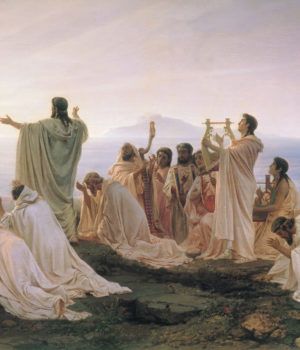By Jack Miller and Brice Hall
On Monday, Nov. 18, RC hosted contemporary Lutheran theologian Dr. Olli-Pekka Vainio of the University of Helsinki for a guest lecture on the intersection between religion and cosmology. Vainio’s talk spoke to the nature of extraterrestrial life from a theological and overall Christian perspective. He completed his postdoctoral program at Oxford and is a renowned Lutheran theologian.
Vainio studies dogmatics and other theological topics in his career. After his lecture here, he is off to San Diego to begin a lecture tour for his new book. His book Cosmology in Theological Perspective has been very well received. RC’s Dr. Paul Hinlicky, Tise Professor of Lutheran Studies, endorsed this book and explained that he has been leading a group at the college that has read and discussed topics in this book.
“The Christian interest in God the creator intersects pretty obviously with the latest scientific cosmological findings with great implications for both sides,” said Hinlicky.
The focus of Vainio’s lecture revolved around the idea that aliens can coexist with faith in a Christian higher power. He responded to an article written for the Huffington Post in which the author claimed that, once humans discover life outside of our own, religion will for the most part be dead. The lecture focused on the relationship between modern cosmology and theology and the similarities and meeting points that these two areas of study share.
Vainio made the claim that although there is much argument between these two schools, the arguments tend to revolve around a few hot button issues. The two that he highlighted were: “How old is the universe?” and “How big is the universe?” Vainio attempts to reconcile these questions and explained that the latter of the two, at least in modern times, has been agreed upon. Both schools of thought believe that the universe itself is infinitely huge and the edges of the universe can never be reached. Photos taken by deep space telescopes have confirmed this.
Vainio also gave listeners context and background to the argument. He claimed that early Church figures historically were not bothered with ideas of the cosmos or the overall stance of humans within it. Rather, humans were more concerned with their relationship to their creator, among other things.
Vainio discussed the astrological theories of men like Ptolemy and Boethius and how their findings can help us understand how cosmology is not opposed to religion. Vainio also Augustinely reconciles science with religion, as he believes the two are different sides of the same coin.
Vainio later talked about Astro-Christology. This is the idea that Christ appears to all alien groups and becomes their Christ figure. Every alien civilization could have their own Christ, composed of the same holy substance as our Christ. He defends this idea using the teachings of Medieval theologian Thomas of Aquinas; God has many natures and can appear to anyone in any one of his natures.
The talk continued with Vainio explaining that although humanity has not yet discovered life on other planets, this fact does not negate the possibility. Vainio also theorized that the concept of extraterrestrial life doesn’t negate the claim that religion is true. He ultimately believes in, and urged listeners to think about, a Christian God who not only created human life on Earth, but also life outside of our planet that we have not yet discovered.
“The interplay of science and religion has always been both a fascinating and immensely relevant topic. Cosmology has become an increasingly important scientific field in recent centuries, and with each discovery in the field, new questions arise that require answers. This talk in particular was interesting because modern cosmology has created room for the existence of life outside of the earth’s sphere of influence and has increasingly emphasized the size of the universe,” said sophomore Adam Reedy.
Vainio concluded his speech by referencing Christian author C.S. Lewis. Vainio read an excerpt of Lewis’s book Out of the Silent Heavens. This excerpt was about the beauty of space and reasserts that we are all a part of God’s plan.




